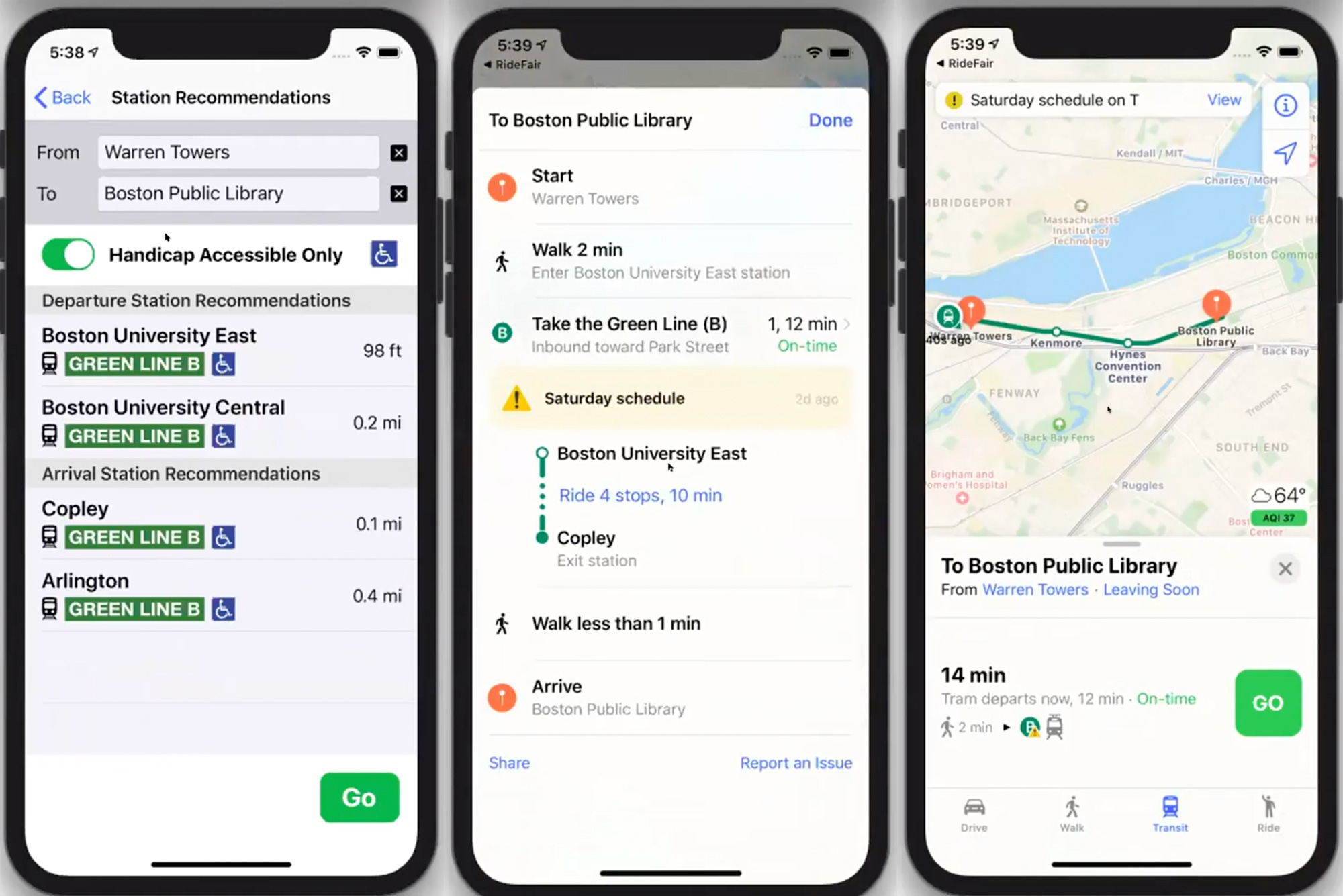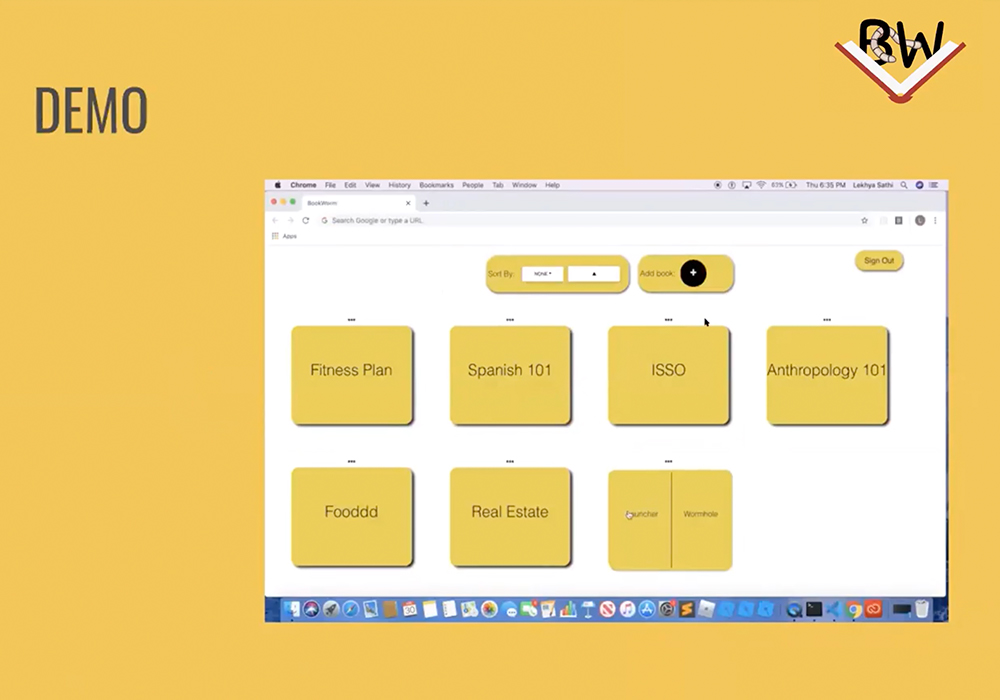BU Spark! Innovation Fellows and X-Lab Practicum Programs Name Best Idea, Tech, and Design Winners

RideFair won the BU Spark! award for Best Technology. The app integrates with Apple Maps or Google Maps to help disabled people use public transportation in Boston. Photo courtesy of BU Spark!
BU Spark! Innovation Fellows and X-Lab Practicum Programs Name Best Idea, Tech, and Design Winners
Invention for theater technology, software for sorting URLs, and an app for disabled public transportation users chosen
This semester, students working with entrepreneur incubator program BU Spark! were tasked with working on apps and inventions that solve societal problems through technology.
So after the Zoom call for the virtual BU Spark! demo day on May 1 kicked off with danceable music, including Whitney Houston’s “I Wanna Dance with Somebody (Who Loves Me),” it became all business.
“The students who are here today have really been heroic in reaching this point,” said Spark! director Ziba Cranmer on demo day, acknowledging the disruption of adjusting to remote teaching and learning caused by the COVID-19 pandemic. “I think it’s kind of a miracle that we’re here.”
Now housed under the BU Faculty of Computing and Data Sciences, BU Spark! was created in 2017 with a $1 million gift from the Mullen Family Foundation. As part of the incubator, students can participate in the Innovation Fellows Program, a semester-long BU Hub Cross-College course combining elements of computer science, design, and business. Cranmer, James Grady, a College of Fine Arts assistant professor of art and graphic design, and Spark! instructor Richard Kasperowski each cover one those course areas.
Another way students can participate is the BU Spark! X-Lab Practicum, a program where students work with Boston-area organizations to complete projects. Students can choose whether to do it as a paid on-campus internship or for course credit.
The end of semester two-hour exposition of Spark! student projects was broken up into three parts: first, the Spark! Fellowship teams presented the working prototypes of apps they created, then X-Lab teams presented the work they did with outside organizations, and finally, the audience could move into separate Zoom calls to find out more information about the projects.
The contest asked those tuned in to vote for their picks for Best Technology, Best Design, and Best Idea. Students worked in groups of three to six, filling roles like user experience designer, software developer, data scientist, and more.
Bookworm, an internet browser extension that saves and self-sorts links into folders within one window to eliminate clutter from desktops, earned the award for Best Idea. It started as a project aimed at helping dyslexic people read articles.
“I was thinking about how I can help students and the community around me more, because I realized that I see a lot of annoying instances with how cluttered our tabs would get,” says Louis Nguyen (CAS’21). “All these different projects get displayed as different windows, and I’d keep them [open], but it would really slow my computer down or I’d always forget where a specific tab is or which window I need to focus on. I’d spend too much time trying to organize the tabs I had.”

MAIMAI, a Craigslist-like marketplace app targeted toward Chinese students needing to sell furniture quickly at the end of the year, won Best Design. The group decided to make speed of sales the main focus of the app because international students have a short window of time to sell their things before they go home for the summer.
“My friend and I were trying to move, and we could not find a platform especially for Chinese international students who sell their secondhand products in a time-sensitive manner,” says Yian Zhao (CFA’20, CAS’20), the app’s user experience designer. “When we posted our products on various platforms, [potential buyers] focused more on price, but we really need to sell before the last day to move out of our apartment. We started interviews, and we found it’s a really common problem, especially for Chinese international students.”
RideFair won the award for Best Technology. The app integrates with Apple Maps or Google Maps to help people with disabilities use Boston’s public transportation system. It uses a crowdsourced rating and commenting system within the app so users can see how accessible various stops are and whether the advertised accessibility features within stations work.
Team member Ivy Chenyao (CAS’20) says her goal was to create an app that could help its users in a unique way. “Talking to one of the mentors, they pointed out that people with disabilities who take public transportation have a lot of the different struggles that I was describing, but in a completely different way,” Chenyao says, “and that space is untouched for the disabled community.”
Keshav Maheshwari (CAS’21), who had experience working on apps when he started the program, says that due to the limited amount of time, the group wanted to focus on helping people in wheelchairs and senior citizens. He says Apple’s app development software Xcode made the development process easier for his group once the pandemic forced them to work remotely.
The X-Lab Practicum students, working with 1984 Generative Graphics, won this year’s prize for Most Interesting Technology. The project, in conjunction with Clay Hopper, a College of Fine Arts lecturer in directing and theater arts, is for use in a play-in-progress, Random Actor, about a drug that lets people delete their bad memories. The technology is a special effect to be used on stage—it’s in the form of a particle system that simulates an actor’s drug use, with the visual particles projected onto the actor and floating away to show the loss of bad memories.
The students say they will continue working on the apps this summer. RideFair’s Maheshwari says their efforts will focus on the technical side of things. “We want to make RideFair more user-friendly in terms of the maps, because currently, our navigation is not so state-of-the-art,” he says. “Our basic goal is to have everything inside of our app, which means that we will be competing with Apple Maps and Google Maps. That’s in the near future—we couldn’t do that this semester.”
Comments & Discussion
Boston University moderates comments to facilitate an informed, substantive, civil conversation. Abusive, profane, self-promotional, misleading, incoherent or off-topic comments will be rejected. Moderators are staffed during regular business hours (EST) and can only accept comments written in English. Statistics or facts must include a citation or a link to the citation.